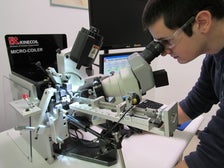Mass. schools not keeping pace with needs of our economy
 Andre Mayer
Andre Mayer
Massachusetts companies need workers with the right skills who can help them succeed in a rapidly changing global economy.
But that goal remains at risk because our education system is not keeping pace with the demands of the commonwealth's economy. Experts estimate that almost three-quarters of all jobs in Massachusetts will require post-secondary training by the year 2020. Since that's just five years away, that's sobering news as we confront a shortfall of 55,000 to 65,000 graduates from the state's public schools over the next decade.
A shrinking college-age population and growing proportions of low-income and minorities mean that the need for educated workers can be met only by raising college completion rates, closing achievement gaps, and attracting students from underserved populations. But funding is an issue: Massachusetts' per-student appropriation for higher education is only 60 percent of the average of the top 10 states, and the commonwealth ranks 46th in need-based state financial aid.
Meanwhile, employers that are struggling to find qualified workers understand that outcomes in higher education depend on the effectiveness of early education and primary and secondary schools. The most important, immediate step to strengthen K-12 education is completion of the transition to the Common Core curriculum and Partnership for Assessment of Readiness for College and Career (PARCC) assessment program, to which Massachusetts committed itself in 2010.
These initiatives are cooperative undertakings by several states, with Massachusetts playing a leading role. Far from backing off the MCAS program, implemented as part of the commonwealth's education reform initiatives in the 1990s, Common Core and PARCC include comparable or superior standards in a much more useful form. While MCAS is basically an eighth-grade-level test administered to high school sophomores, a new system will have greater bearing on student preparation for college and the workplace. And economies of scale in the multi-state approach will permit a more student-centered assessment process that supports targeted assistance.
Recently, the Massachusetts Business Alliance for Education commissioned a team of international experts to conduct a review of education in the commonwealth, using the world's best systems as a benchmark, and to outline steps to keep our system globally competitive. We support that effort. In education, as in business, “the best” is not something you are, but something you do. To be and stay the best, we must measure ourselves against the best and foster a culture of continuous improvement and innovation.
Government and business must work together to develop the best educational system in the world to educate and train workers with the right skills for a global economy. As part of that effort, they should consolidate education and workforce development systems that remain separate and inconsistent. They should also elevate the role of vocational education and its potential to provide people with the necessary skills to realize their economic dreams.
Andre Mayer is senior advisor at Associated Industries of Massachusetts (AIM), based in Boston. AIM recently released its Blueprint for the Next Century, a plan for economic growth that addresses the role of education in developing necessary workplace skills.











0 Comments